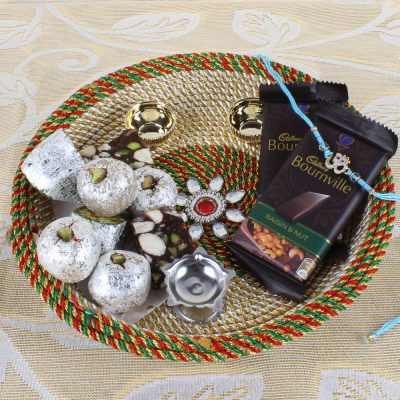India is a land of diverse cultures and traditions, and this diversity is beautifully reflected in its festivals. Two such festivals, Raksha Bandhan and Bhaidooj, are celebrated with great enthusiasm and hold special significance in the hearts of Indians. While both festivals revolve around the bond between siblings, they have distinct customs and rituals that set them apart. In this blog, we will delve into the differences between Raksha Bandhan and Bhaidooj and explore how they are celebrated across India.
Raksha Bandhan: A Celebration of Sibling Love
Raksha Bandhan, also known as Rakhi, is a Hindu festival that celebrates the unique bond between brothers and sisters. It occurs during the full moon in the month of Shravana, usually in August. The central tradition of Raksha Bandhan involves the sister tying a sacred thread, known as Rakhi, around her brother’s wrist. In exchange, the brother makes a commitment to safeguard and provide lifelong support to his sister. The Rakhi serves as a symbol of their bond, signifying love, trust, and protection.
Celebrations of Raksha Bandhan vary across different regions of India, but the essence of the festival remains the same. Sisters prepare aarti thalis with a diya (lamp), sweets, and the Rakhi. Conversely, the brother offers gifts to his sister and pledges to protect her. It is a day filled with love, joy, and cherished moments spent together.
Bhaidooj: Honouring the Brother-Sister Relationship
Bhaidooj, also known as Bhai Phota, Bhai Tika, or Bhau Beej, is another significant festival that celebrates the bond between siblings. It is observed on the second day after Diwali, in the month of Kartika (October or November). While Raksha Bandhan is predominantly a North Indian tradition, Bhaidooj is widely celebrated throughout India.
The Bhaidooj ceremony involves sisters applying a sacred tika (vermillion) on their brothers’ foreheads, performing aarti, and exchanging sweets. Sisters pray for their brothers’ well-being, prosperity, and long life. This festival holds deep cultural importance as it strengthens the brother-sister relationship and signifies the love and care they have for each other.
Differences in Customs and Rituals
Although both Raksha Bandhan and Bhaidooj celebrate sibling love, they differ in their customs and rituals.
Timing:
Raksha Bandhan falls in August (Shravana).
Bhaidooj is celebrated in October or November, typically a few days after Diwali.
Rituals:
Raksha Bandhan involves tying a Rakhi on the brother’s wrist.
Bhaidooj includes applying tika on the brother’s forehead.
Significance:
Raksha Bandhan symbolizes the brother’s commitment to protect his sister.
Bhaidooj focuses on honoring the brother-sister relationship and seeking blessings for the brother’s well-being.
Regional Variations:
Raksha Bandhan is more prevalent in North India.
Bhaidooj is celebrated across India, transcending regional boundaries.
Festive Time:
Raksha Bandhan is usually a daytime festival.
Bhaidooj festivities often extend into the evening.
Celebrating the Festivals Across India
Both Raksha Bandhan and Bhaidooj are celebrated with much enthusiasm and excitement across India, and each region adds its unique cultural flavors to these festivals.
North India:
Raksha Bandhan in North India is marked by sisters tying intricately designed Rakhis on their brothers’ wrists.
Bhaidooj sees sisters applying colorful tika and performing aarti for their brothers.
West India:
In Maharashtra, Bhaidooj is celebrated with grandeur. Brothers visit their sisters’ homes, and family gatherings are common.
Gujarat and Rajasthan have vibrant celebrations of both Raksha Bandhan and Bhaidooj, with women dressing in traditional attire.
South India:
Raksha Bandhan and Bhaidooj are celebrated in South India, but with distinct names and regional variations.
East India:
Bhaidooj is particularly significant in Bengal, where sisters pray for their brothers’ well-being.
Odisha also observes this festival with great fervor.
Conclusion
Raksha Bandhan and Bhaidooj are two beautiful festivals that celebrate the eternal bond between siblings. While they share the common theme of sibling love and protection, they each have their unique customs and rituals that make them special. These festivals transcend geographical and cultural boundaries, uniting families across India in the spirit of love and togetherness. Whether it’s the tying of a sacred thread or applying a tika, these traditions reinforce the unbreakable brother-sister relationship and create lasting memories. So, whether you celebrate Raksha Bandhan or Bhaidooj, the essence remains the same—a celebration of the cherished bond that siblings share.

